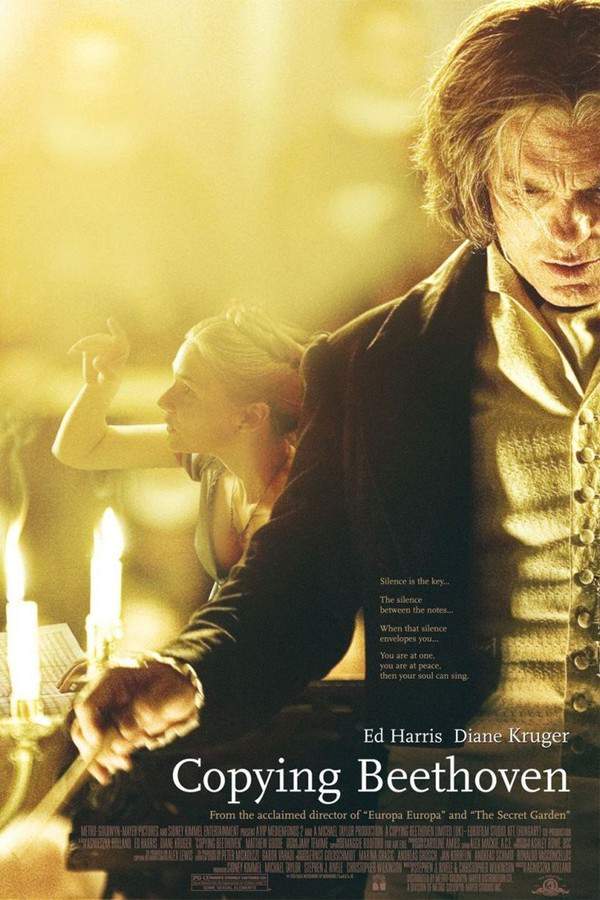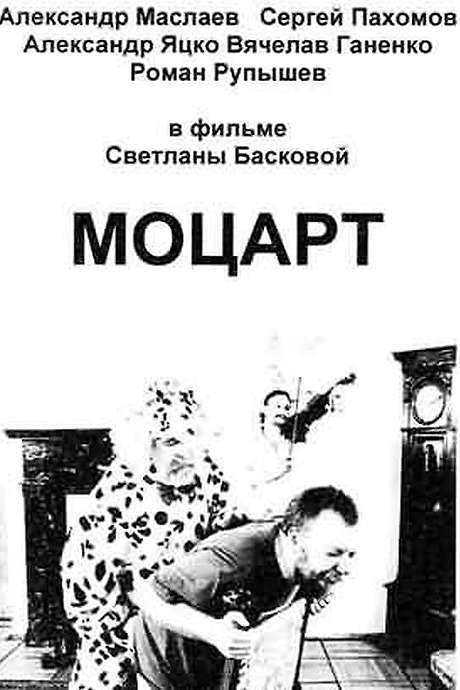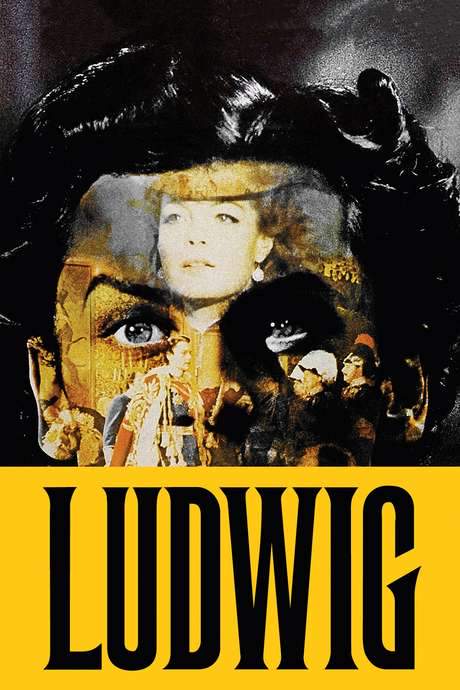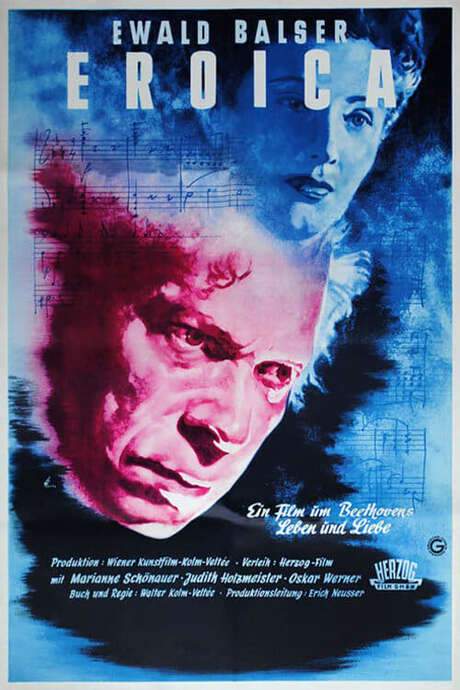Copying Beethoven 2006

In 19th century Vienna, Anna Holtz, a talented and devoted music student, becomes involved with the renowned composer Ludwig van Beethoven. As their lives intersect, Beethoven's difficult personality begins to mellow, and an unexpected friendship develops between them. However, their connection faces challenges when Anna's engagement to another man looms, creating a complex emotional situation for all involved.
Does Copying Beethoven have end credit scenes?
No!
Copying Beethoven does not have end credit scenes. You can leave when the credits roll.
Meet the Full Cast and Actors of Copying Beethoven
Explore the complete cast of Copying Beethoven, including both lead and supporting actors. Learn who plays each character, discover their past roles and achievements, and find out what makes this ensemble cast stand out in the world of film and television.
External Links and Streaming Options
Discover where to watch Copying Beethoven online, including streaming platforms, rental options, and official sources. Compare reviews, ratings, and in-depth movie information across sites like IMDb, TMDb, Wikipedia or Rotten Tomatoes.
Ratings and Reviews for Copying Beethoven
See how Copying Beethoven is rated across major platforms like IMDb, Metacritic, and TMDb. Compare audience scores and critic reviews to understand where Copying Beethoven stands among top-rated movies in its genre.

59
Metascore
7.2
User Score


28%
TOMATOMETER

56%
User Score

6.7 /10
IMDb Rating

64
%
User Score
Take the Ultimate Copying Beethoven Movie Quiz
Challenge your knowledge of Copying Beethoven with this fun and interactive movie quiz. Test yourself on key plot points, iconic characters, hidden details, and memorable moments to see how well you really know the film.
Copying Beethoven Quiz: Test your knowledge about the poignant drama 'Copying Beethoven' and its characters.
Who plays the role of Ludwig van Beethoven in the film?
Ed Harris
Matthew Goode
Ralph Riach
Joe Anderson
Show hint
Full Plot Summary and Ending Explained for Copying Beethoven
Read the complete plot summary of Copying Beethoven, including all major events, twists, and the full ending explained in detail. Explore key characters, themes, hidden meanings, and everything you need to understand the story from beginning to end.
Copying Beethoven is a compelling period drama that delves into the final year of Ludwig van Beethoven, portrayed by Ed Harris. The film opens with a poignant scene featuring a frail Beethoven, while Anna Holz, played by Diane Kruger, witnesses this profound moment, establishing an emotional connection between them right from the start.
The narrative transports us back to the time when Wenzel Schlemmer, Beethoven’s publisher, desperately searches for a talented copyist to assist in completing the score for his Ninth Symphony ahead of its much-anticipated debut. Anna Holz, a fictional character likely inspired by a close friend of Beethoven named Karl Holz, steps forward as the best available copyist. Initially taken aback by the prospect of working with a woman, Beethoven soon finds that their collaboration flourishes, leading to Anna aiding in the magnificent premiere of his final symphony.
As the story unfolds, we also meet Martin Bauer, portrayed by Matthew Goode, who is Anna’s love interest and engrossed in designing a novel bridge. While Martin engages his intellect for his engineering projects, Beethoven is deeply connected to the emotional and spiritual aspects of life. Caught in a difficult position, Anna feels the weight of choosing between the two men.
The tension escalates when Beethoven, exhibiting his unfiltered temperament, shatters Martin’s bridge model and makes harsh remarks about one of Anna’s compositions, prompting her to leave him. When Martin realizes his mistake, he pleads for forgiveness, and Anna ultimately yields, understanding that both art and love transcend mere logic.
The duo continues to collaborate on Beethoven’s works, as well as Anna’s own compositions, until the maestro’s passing. Interwoven within this narrative is a subplot that reveals Beethoven’s tumultuous relationship with his nephew, Karl van Beethoven. The young man, portrayed by Joe Anderson, struggles with his uncle’s expectations and feels inadequate as he battles his gambling debts while avoiding Beethoven’s hopeful aspirations for a worthy successor.
This intricate tapestry of relationships underscores the struggles of artistry, emotion, and familial obligation, making Copying Beethoven a heartfelt examination of the human experience against the backdrop of genius.
Uncover the Details: Timeline, Characters, Themes, and Beyond!

Coming soon on iOS and Android
The Plot Explained Mobile App
From blockbusters to hidden gems — dive into movie stories anytime, anywhere. Save your favorites, discover plots faster, and never miss a twist again.
Sign up to be the first to know when we launch. Your email stays private — always.
Watch Trailers, Clips & Behind-the-Scenes for Copying Beethoven
Watch official trailers, exclusive clips, cast interviews, and behind-the-scenes footage from Copying Beethoven. Dive deeper into the making of the film, its standout moments, and key production insights.
Copying Beethoven Themes and Keywords
Discover the central themes, ideas, and keywords that define the movie’s story, tone, and message. Analyze the film’s deeper meanings, genre influences, and recurring concepts.
Copying Beethoven Other Names and Titles
Explore the various alternative titles, translations, and other names used for Copying Beethoven across different regions and languages. Understand how the film is marketed and recognized worldwide.
Similar Movies To Copying Beethoven You Should Know About
Browse a curated list of movies similar in genre, tone, characters, or story structure. Discover new titles like the one you're watching, perfect for fans of related plots, vibes, or cinematic styles.
Quick Links: Summary, Cast, Ratings, More

What's After the Movie?
Not sure whether to stay after the credits? Find out!
Explore Our Movie Platform
New Movie Releases (2026)
Famous Movie Actors
Top Film Production Studios
Movie Plot Summaries & Endings
Major Movie Awards & Winners
Best Concert Films & Music Documentaries
Movie Collections and Curated Lists
© 2026 What's After the Movie. All rights reserved.



































